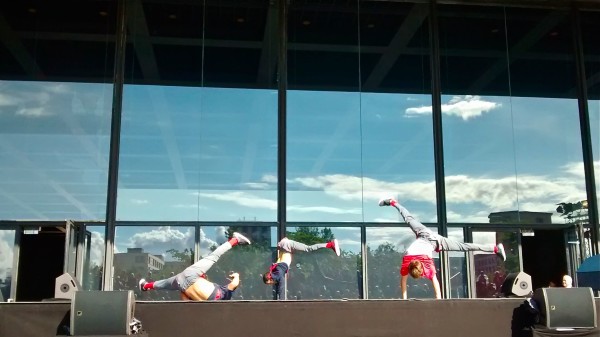Flying Bach: A Successful Berlin Export?

I first saw Flying Bach four years ago in the modern interior of the Neue Nationalgalerie. Breakdancing to JS Bach’s Well Tempered Clavier seemed to me then, and now, as completely unexpected and at the same time completely right.
The intricacy and control of the dancers follows the interlocking lines of the preludes and fugues. At times, each b-boy assumes a voice, and we are provided with a visual depiction of Bach’s artistry––one dancer beginning the melody, which is imitated and followed, in counterpoint, by the others, until the gyrating, flexing and spinning create a textured choreographed whole. The director Christoph Hagel, leans in, live and unflustered, on the piano, the next piece is taken over by the harpsichord, or by electronic remixes of Bach’s remarkable work.
Flying Bach does not only represent a delectable collision of styles––the frisson of seeing breakdance to Baroque music instead of Hiphop––but also represents a challenge to or reappropriation of German high culture.
The Flying Steps were founded in 1993 by Vartan Bassil and Kadir “Amigo” Memis. Vartan, like many of his fellow b-boys, comes from an immigrant family (he was born in Lebanon), and their academy finds itself in deepest SO36, Berlin’s center for both alternative and conservative immigrant, mostly Turkish, life. I am not the only one to observe how Europe’s immigrants have turned to breakdancing––looking to African-American models––in order to express their subaltern urban identities. For these Berlin b-boys from the ghetto then to graft this inheritance onto the symbol of German musical high culture represents a sweet little genealogy for those cultural studies folks out there.
This week Flying Bach finally took their production to the United States. They have already brought the performance to Japan, Australia, Canada, the Eurovision Song Contest, but this is the first time they show in the United States––the home of b-boying. And so I was extremely interested to see how this Berlin export––this strange hybrid which is very much a product of the stewing cultural milieus of Kreuzberg and Neukölln––would fare in Chicago’s prime venue, The Civic Opera House.
There have been a few changes from the original cast. The fabulous and inspirational Yui Kawaguchi, a staple of the indie Berlin dance scene, left the company recently, along with a number of the Flying Steps b-boys. The sole female lead position has been taken over by the very capable Swedish dancer Anna Holmström. I have seen this new production and recognise that I am perhaps too loyal to the old cast to feel it has quite the same energy. Each time I see Flying Bach, it appears even slicker (perhaps the influence of the sponsorship of a big drinks company, Red Bull) and rehearsed. Or have I simply lost the spontaneity of the first viewing? I am looking for the intimacy, experimentation and novelty of that first experience in Mies van der Rohe’s iconic Berlin museum, and find it cannot be repeated. Now, there is a big booming sound system and elaborately high-tech lighting.
The Chicago press’s reaction to the tour to the Midwestern metropolis focused on different disappointments. The Chicago Sun-Times said everything you’d expect them to say about such an internationally successful Berlin export (“electrifying”, an “enjoyable mashup”). It was surprising and gratifying to see them quote the front-page dedication of Bach’s Well Tempered Clavier (“to the profit and use of musical youth desirous of learning, and especially for the pastime of those already skilled in this study”), thinking cleverly about the b-boys as the “musical youth”. But some reflection on the most interesting cultural crossovers in this piece were lost. It was simply entertainment.
This goes too for the more upmarket Chicago Tribune. The Tribune, however, had other, serious, problems with the piece, in particular a moment in the performance when a b-boy, Nordine-Dany Grimah, slaps Anna Holmström melodramatically across the face. Having spoken to one of the dancers, I learned that this moment of violence (which the Tribune calls “at best, a problematic message to send out to the many young women in this youthful audience and, at worse, misogynistic”) was an innovation of the b-boys themselves who wanted to explore violence against women, and correct that violence through movement, showing the alienation of the culprit, and then reconciliation. To my mind, this mini-story in the production is cut from the same cloth as a soap-opera, a convention out of place in a piece carried by the music and dancing alone. For the Tribune, it turned out to be a politically-incorrect no no. Is it that you can’t slap women on stage, even to then explore the consequences (was there no trigger warning? does it get to close to the reality of how often women are actually slapped by brutal men?)? The reviewer says Holmström is outnumbered seven to one, and this represents a “glaring inequality”. American audiences are inured to a great many depictions of violence, but apparently not this one.

I suppose I had great hopes that reviewers in Chicago would understand at some level what it means for boys from Berlin’s “hood” to be dancing to Bach, and that they would get beyond the home-grown docility of political correctness. But I guess I was asking for too much. This is not to say Americans don’t understand Bach, or don’t understand breakdancing. They get both, but perhaps not together in the context of Germany’s integration debates. For Flying Bach to be more than just entertainment––to be understood for its political significance, as it storms the castle of German high culture––perhaps it shouldn’t be for export.
